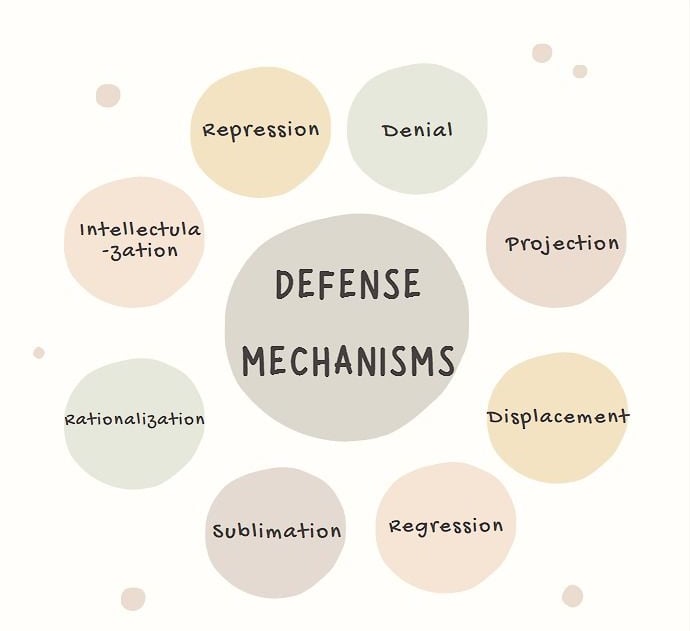“Freud Defense Mechanisms in Psychology | Types, Examples & Psychology Explained”
“Freud Defense Mechanisms explain how the ego protects us from stress and anxiety. Learn the types, examples, and role of defense mechanisms in psychology.”
9/7/20252 min read


Defense Mechanisms in Psychology: Freud’s Theory Explained
🧠 Introduction
Sigmund Freud, the father of psychoanalysis, introduced the concept of defense mechanisms as part of his structural model of the psyche. According to Freud, the ego uses these unconscious strategies to protect us from anxiety, stress, and inner conflict.
Defense mechanisms can be both helpful and harmful. They reduce emotional pain in the short term, but overuse may distort reality and affect mental health. Understanding them gives us powerful tools for self-awareness, emotional regulation, and personal growth.
🔍 What Are Defense Mechanisms?
Definition: Defense mechanisms are unconscious psychological strategies that protect us from uncomfortable emotions, painful memories, or threats to self-esteem.
Function: They act as a buffer between the Id’s impulses, the Superego’s morality, and the Ego’s reality principle.
Impact: They can be adaptive (healthy coping) or maladaptive (unhealthy avoidance).
👉 Example: When we deny a painful truth, we reduce anxiety temporarily but may prevent real problem-solving.
🛡️ Freud’s Common Defense Mechanisms (with Examples)
1. Denial – Refusing to Accept Reality
Rejecting facts that cause distress.
Example: A smoker ignoring health warnings.
2. Repression – Blocking Painful Memories
Unconscious pushing away of traumatic experiences.
Example: Forgetting childhood abuse until adulthood.
3. Projection – Attributing Feelings to Others
Blaming others for your own emotions.
Example: Accusing someone of disliking you when you dislike them.
4. Displacement – Redirecting Emotions
Shifting feelings to a safer target.
Example: Arguing with family after a stressful day at work.
5. Rationalization – Justifying Behavior
Creating logical excuses for emotional actions.
Example: “I failed the exam because the teacher is unfair.”
6. Regression – Reverting to Childlike Behavior
Returning to earlier developmental stages when stressed.
Example: Throwing tantrums or sulking in adulthood.
7. Sublimation – Channeling Energy Positively
Converting impulses into acceptable activities.
Example: Turning anger into art, sports, or creative writing.
8. Reaction Formation – Doing the Opposite of True Feelings
Expressing exaggerated behaviors contrary to inner feelings.
Example: Overly praising someone you secretly envy.
9. Intellectualization – Detaching from Emotion
Focusing on facts instead of feelings.
Example: Talking only about medical details during grief.
10. Suppression – Conscious Avoidance
Choosing to delay thoughts instead of confronting them immediately.
Example: Setting aside anger until after an important meeting.
🌍 Defense Mechanisms in Daily Life
Defense mechanisms are part of everyday human behavior. For example:
At work → Rationalization helps explain failures; sublimation drives productivity.
In relationships → Projection can cause misunderstandings; suppression may prevent fights.
For mental health → Repression may protect in the short term, but therapy is needed to process hidden trauma.
👉 Balanced use of defense mechanisms helps us adapt, while overreliance can create emotional struggles.
🧩 Adaptive vs Maladaptive Defense Mechanisms
Adaptive (Healthy): Sublimation, humor, suppression — promote growth and coping.
Maladaptive (Unhealthy): Denial, repression, projection — distort reality and hinder healing.
🧠 Why Freud’s Defense Mechanisms Still Matter
Even though Freud’s ideas have been debated, defense mechanisms remain relevant in modern psychology. They are used in therapy, counseling, and self-development to help people:
Recognize unhealthy coping patterns.
Build healthier emotional strategies.
Improve relationships and resilience.
✅ Conclusion
Freud’s defense mechanisms are powerful insights into how our unconscious mind protects us from emotional pain. By learning to identify these patterns, we gain greater self-awareness, emotional intelligence, and mental strength.
Understanding defense mechanisms doesn’t just explain our past behavior — it gives us tools to live with more clarity, balance, and authenticity.

